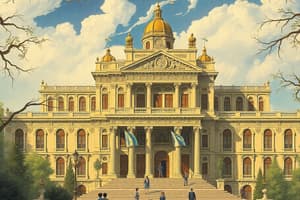Podcast
Questions and Answers
¿Qué tipo de tribunales se mencionan como parte de los cambios introducidos por el Decreto Supremo 0012-2019-TR?
¿Qué tipo de tribunales se mencionan como parte de los cambios introducidos por el Decreto Supremo 0012-2019-TR?
- Tribunales laborales y tribunales penales. (correct)
- Tribunales de menores y tribunales comerciales.
- Tribunales administrativos y tribunales fiscales.
- Tribunales de tránsito y tribunales familiares.
¿Cuál fue una crítica común al Decreto Supremo 0012-2019-TR en relación con la estabilidad laboral?
¿Cuál fue una crítica común al Decreto Supremo 0012-2019-TR en relación con la estabilidad laboral?
- Que promovía la inestabilidad laboral de los jueces. (correct)
- Que no abordaba la cuestión de la estabilidad laboral de los jueces.
- Que garantizaba la estabilidad laboral de los jueces.
- Que reducía la carga de trabajo de los jueces.
¿Qué función adicional se creó según el Decreto Supremo 0012-2019-TR para supervisar los recursos judiciales?
¿Qué función adicional se creó según el Decreto Supremo 0012-2019-TR para supervisar los recursos judiciales?
- Administradores financieros y inspectores. (correct)
- Abogados y notarios.
- Asesores legales y mediadores.
- Peritos forenses y detectives.
¿Qué preocupa a defensores de derechos humanos en relación con el Decreto Supremo 0012-2019-TR?
¿Qué preocupa a defensores de derechos humanos en relación con el Decreto Supremo 0012-2019-TR?
¿Qué logro se destaca como uno de los efectos positivos iniciales de la implementación del Decreto Supremo 0012-2019-TR?
¿Qué logro se destaca como uno de los efectos positivos iniciales de la implementación del Decreto Supremo 0012-2019-TR?
¿Qué problema persiste a pesar de las mejoras iniciales derivadas del Decreto Supremo 0012-2019-TR, según el texto?
¿Qué problema persiste a pesar de las mejoras iniciales derivadas del Decreto Supremo 0012-2019-TR, según el texto?
¿Cuál era uno de los objetivos del Decreto Supremo 0012-2019-TR?
¿Cuál era uno de los objetivos del Decreto Supremo 0012-2019-TR?
¿Qué aspecto clave se menciona en el Decreto Supremo 0012-2019-TR para abordar los desafíos históricos del sistema judicial argentino?
¿Qué aspecto clave se menciona en el Decreto Supremo 0012-2019-TR para abordar los desafíos históricos del sistema judicial argentino?
¿Qué consecuencia negativa prevista del Decreto Supremo 0012-2019-TR es mencionada en el texto?
¿Qué consecuencia negativa prevista del Decreto Supremo 0012-2019-TR es mencionada en el texto?
¿Cuál era uno de los problemas que enfrentaba el sector de justicia de Argentina antes de la implementación del Decreto Supremo 0012-2019-TR?
¿Cuál era uno de los problemas que enfrentaba el sector de justicia de Argentina antes de la implementación del Decreto Supremo 0012-2019-TR?
¿Cuál era uno de los objetivos del Decreto Supremo 0012-2019-TR en relación con los casos pendientes?
¿Cuál era uno de los objetivos del Decreto Supremo 0012-2019-TR en relación con los casos pendientes?
¿Qué aspecto destacado del Decreto Supremo 0012-2019-TR se menciona como parte del esfuerzo por fortalecer el sistema judicial argentino?
¿Qué aspecto destacado del Decreto Supremo 0012-2019-TR se menciona como parte del esfuerzo por fortalecer el sistema judicial argentino?
Flashcards are hidden until you start studying
Study Notes
Decreto Supremo 0012-2019-TR: Unfolding Changes in Argentina's Judicial System
On October 8th, 2019, Argentine President Mauricio Macri signed Decreto Supremo 0012-2019-TR into law—a legal instrument striving to reform the nation's judiciary. This decree has been one of the most discussed and debated aspects of Macri's administration due to its potential impact on justice and the rule of law within Argentina.
The following sections will examine key aspects of this decree, including its goals, structure, criticism, and consequences.
Goals of Decreto Supremo 0012-2019-TR
This decree aimed to modernize Argentina’s judicial system through several measures. Some of these included reducing bureaucracy, improving efficiency by digitizing processes, enhancing transparency, decreasing case backlogs, promoting specialization among judges, increasing accessibility, and strengthening public trust in the judiciary. These objectives were intended to address longstanding challenges faced by Argentina's justice sector, which had previously suffered from high caseloads, inconsistent jurisprudence, corruption allegations, and concerns over credible judgments.
Structure of Decreto Supremo 0012-2019-TR
The decree consisted of seven titles containing numerous clauses covering various facets of the justice sector. Among other things, it addressed matters related to family courts, civil courts, criminal courts, social security courts, labor courts, administrative tribunals, and mixed jurisdiction courts. Additionally, it introduced significant changes such as limiting the number of cases heard by each judge and establishing specialized chambers dedicated to specific types of crimes, like cybercrime and child exploitation. The decree also created new positions, like financial administrators and inspectors, with responsibilities ranging from monitoring court resources to ensuring compliance with the recently passed legislation.
Criticism of Decreto Supremo 0012-2019-TR
While there was widespread agreement regarding some of the needs for change within Argentina's judiciary, many stakeholders worried that speedy implementation might result in hastily drafted laws and unintended consequences. In particular, critics pointed out potential drawbacks concerning job stability, workload distribution, trial duration, and the size of professional courts. They argued that the decree did little to combat alleged corruption within certain sectors of the justice system and failed to address historical structural issues.
Additionally, challengers highlighted how different segments of society would be disproportionately affected by the decree. For instance, indigenous peoples felt their rights could suffer if the reforms led to less attention being paid to cultural sensitivities during trials. Similarly, human rights advocates raised alarms about possible infringements upon individual liberties resulting from increased state control over parts of the judicial process.
Consequences of Implementing Decreto Supremo 0012-2019-TR
As of today, more than four years after its enactment, assessing the complete effects of Decreto Supremo 0012-2019-TR is difficult because full implementation remains ongoing, and results have yet to stabilize. However, initial findings suggest improvements in specific areas, such as reduced caseloads and shorter wait times for judicial decisions. Furthermore, digital innovations have enabled remote proceedings, making justice more accessible amidst pandemic restrictions. Nonetheless, further complications remain, particularly when addressing criticisms surrounding political interference and uneven application across regional jurisdictions. Therefore, comprehensive evaluation requires continued observation and analysis.
Studying That Suits You
Use AI to generate personalized quizzes and flashcards to suit your learning preferences.




